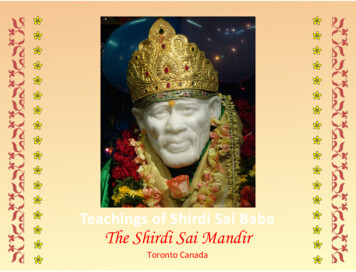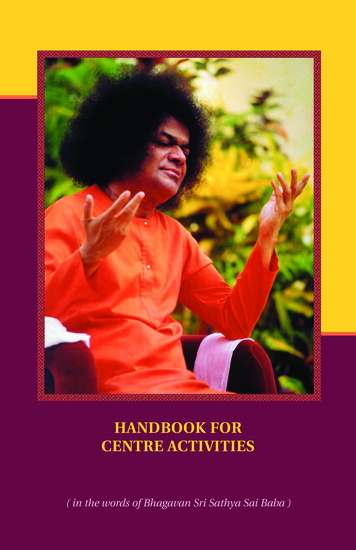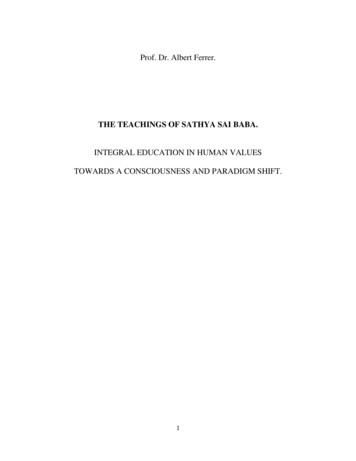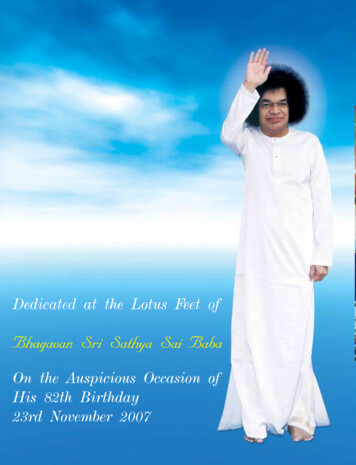
Transcription
Teachings of Bhagawan Sri Sathya Sai BabaVolume 3Who Is Dear to the LordTwenty Virtues Essential for WisdomTen Types of Purity
Bhagawan Sri Sathya Sai BabaDedicated with love and reverence at the Divine Lotus Feet of
Teachings of Bhagawan Sri Sathya Sai BabaVolume 3 2014 Sathya Sai International OrganisationAll Rights Reservedpublications@ssswf.orgAbout printing this book:Please use the “fit to printable area” option on yourcomputer when printing this bookTo read “Teachings of Bhagawan Sri Sathya Sai Baba,” Volumes 1 and 2 please go tothe following link: http://sathyasai.org/publications/Topics covered:Volume 1: Ceiling on Desires/Eight Flowers of WorshipVolume 2: Silence/You Cannot Always Oblige, But You Can Always Speak Obliginglyi
Contents1Who Is Dear to the LordDevoid of Desires Absolutely Pure Firm in DeterminationCompletely Detached Free from Grief Renounced Pomp and Ostentation10Twenty Virtues Essential for WisdomHumility Absence of Vanity Non-violencePatience, Fortitude IntegrityReverential Service Rendered to the Spiritual TeacherCleanliness Steadfastness Control of the sensesDetachment Absence of EgotismAwareness of Birth-Death-Old Age-Illness-GriefWithdrawal of Desire for ObjectsAbsence of attachment to family and homeEquanimity Devotion SolitudeAbsence of Interest in the Company of the Worldly MindedAwareness of the Distinction between Atma and non-AtmaExperience of Atma15Ten Types of PurityPurity of Your ResidenceMutual Understanding and Cooperation in the FamilyPure Food Pure WaterPure Thoughts and Feelings Pure VisionPure Reading and Writing Pure ServicePure Spiritual Discipline Pure Work18Glossaryii
Who Is Dear to the LordDevoid of DesiresAbsolutely PureFirm in DeterminationCompletely DetachedFree from GriefRenounced Pomp and OstentationMan’s joys and sorrows, happiness or misery are not dependent on time. They arebased on man’s actions. Time has no relations or friends. Time is not subordinate toanyone. All are subject to time. Hence if one is to realise the Divine, who is the Lord ofTime, one has to carry out His injunctions. God looks with love only at such a person.In this context, the Bhagavad Gita has described the traits of the devotee who is dearto the Lord:Anapeksha Shuchir Dakshah Udaaseena Gatavyathah Sarvarambha Parithyaagi YoMadbhaktah Sa Me Priyah—Bhagavad Gita: (12.16)He who is totally devoid of desires, absolutely pure, firm in determination, completelydetached, free from grief, and has renounced pomp and ostentation— such a one is dearto Me.11
SIX QUALITIES ONE SHOULD POSSESS TO BECOME DEAR TO THE LORDANAPEKSHA(Devoid of Desires)do anything and everything. Our actions mustbe such that they please Him and would secureHis approval. If a devotee conducts himself in thisfashion, he becomes dear to the Lord.2There Must Be Control over DesiresAnapeksha means that the devotee is beyondMan Has Taken Birth to Performapeksha, i.e., desires or expectations. Is it ever posHis Dutiessible for man, bound as he is by the body and theWhen man performs actions, regarding himsenses, to be without desires? Hardly. Some desireself, as the doer, the actions become fetters thator the other will always be there. However, therebind him. All actions that are performed with themust be control over the desires that one has.feeling that they are intended as offerings to pleaseWhat sorts of desires are permitted? Recall the Divine do not lead to bondage. They becomewhat Krishna has to say about this matter. He says desireless actions. One has to recognise that it isthat all righteous actions are Divine. Thus, among the Divine Principle in all beings that is gettingthe permissible desires, the best is the desire for all actions done through human beings as instrusacrifice. The yearning for righteousness also is im- ments. As long as man regards himself as the doerportant. The desire for God is mandatory.and enjoyer he cannot escape from the consequences of his actions.Although what must truly be desired is veryclear, people have widely different types of exWhen a man regards a certain piece of landpectations and desires. Although some consider as his, the crops grown on it will belong to him.being righteous as very important, others think The Bhagavad Gita teaches that when actions arethat achieving [worldly] greatness is the best goal. done as offerings to God, they become “desireless”Some even try to combine these two objectives. actions. Man has taken birth to perform his dutiesTruly speaking, no one has the freedom or the au- and not to enjoy power or assert his rights. Whenthority to do as one likes. One must do exactly as one’s duty is performed, the right comes of its ownthe Lord says.accord. Men today fight for their “rights” and forget their duties. Hence discharge of duty comesPerform Actions Exclusively for thefirst. It is through duty that man realises God.1Pleasure of the LordThe Lord has stated very clearly that He wantsyou to attain the state of desirelessness. How doesone do that? One does this by strictly confiningoneself to righteous activities alone, performingsuch actions exclusively for the pleasure of theLord, and by offering all such actions in their entirety to the Lord. Actions performed in this spiritrise well above worldly desires and expectations.Thus the word anapeksha ought not to be interpreted in a very rigid sense.The Lord Is Presentin All Righteous ActionsIn the Bhagavad Gita, the Lord has declaredthat He is present in all righteous actions. Therefore, those who perform righteous actions candevelop desirelessness. This means that when aman performs all actions as offerings to the Lord,they become desireless actions. The Lord is theone who, from within, makes a person act, speak,listen, see, and perform many other actions. HeWhat it really means is having the irresistible is the doer and the enjoyer. If a person performsurge to work only for the Lord and for His sole all actions with the conviction that the Indwellpleasure. However, that does not mean one can ing Lord is the real Doer, then his actions become2
desireless. Hence every spiritual aspirant should ness and not about the purity of the heart within.regard his actions as offerings to the Divine.3However pure the ingredients may be, if the vesselin which they are cooked is not clean, the foodLead Your Life without the Feeling ofwill be spoiled. For a man, his heart is the vessel,“Mine and Thine”and he must see that it is kept pure and untainted.Today man is filled with various desires. Thenwhat is the way to lead a desire-free life? LordUndertake Selfless ServiceKrishna has shown the way for this. He said, “Son,to Purify the Heartthere is nothing wrong in having desires, but all ofFor the purification of the heart, everyonethem must be pleasing to God.” “Let all your ac- must undertake selfless service. Attachments andtions be pleasing to God.”aversions, which pollute the mind, should be eschewed by concentrating on selfless service. It isYou should put into practice the eternal prinonly when the heart is pure that selfless service canciples based on truth and dedicate all your activibe performed. Hence both bodily and mental puties to God. Lead your life without the feeling ofrity are essential for a good devotee.5“mine and thine,” and offer everything to God.Only then can you attain the state of desirelessPurity Is Vital for All Aspirantsness. Today man has both worldly desires and deIt is not enough if the body is clean. Inner pusires that lead to the inward path, but the number rity is essential. The latter, in fact, is more essentialof desires that lead to the inward path pale in com- than the former. For the proper enjoyment of allparison to the number of worldly desires in him.4 things, purity of mind is essential. Whatever sacred acts you may perform in the external world, ifyou have no purity of mind and heart, all of themare valueless.Desirelessness Prevails When AllActions Are Offered to GodIt is only when all actions are done as an offering to God that desirelessness prevails. Whensuch a feeling fills the heart of the devotee, theDivine confers beatitude on him. Such a devoteeis dear to the Lord. If you want to earn the loveof the Lord, you have to render service to anyone,anywhere, as an offering to the Lord.5The food cooked in an un-tinned vessel will bespoiled even if all the ingredients are good. Likewise, in the vessel of the heart, the inside must bepurified by love. Then, all that one consumes willbe wholesome. Hence purity is vital for all aspirants; without it, all man’s actions are tainted. Actions done with an impure heart can only produceundesirable results. Whatever good results youwant to secure in the external world, inner purityis the basis.1SUCHI(Pure)How to Purify the Mind,Speech, and BodyBoth Inner and Outer Purity Is EssentialThe second quality is suchi (purity). Thereshould be both inner and outer purity. Bodily purity relates to the physical. It covers such cleansing acts as bathing, wearing clean clothes, eatingpure food, and the like. Even in studies, the booksshould be wholesome and elevating. But mere external cleanliness without internal purity is of novalue. Everyone, from the scholar to the commonman, is concerned only about external cleanli-All the actions a man performs issue from internal impulses and not from external forces. Theyare a reflection of his inner being. It is only whenman has pure feelings within him that his actionscan be pure. When he is polluted within, all hisactions will be impure.How are the internal impulses to be purified?These relate to the mind, speech, and the body. Of3
the three, speech is the most important. How ispurity in speech to be achieved? Every word youutter should be free from causing excitement oragitation. It should be true and pleasing, says theBhagavad Gita.DAKSHAH(Firm in Determination)Have Strong and UnshakableDeterminationThere are four factors that account for pollution of the tongue. One is uttering falsehood;two, excessive talking; three, carrying tales againstothers; and four, abuse or criticism of others. Thetongue is prone to indulge in these four types ofoffences in speech. Unfortunately, in this Kali(Iron) Age, all four are rampant. Untruth has become ubiquitous. People freely indulge in slandering others. Tale-bearing goes on. Indulgence inloquacity is widespread. It is only when one getsrid of these four evil tendencies that his speech canbecome pure and unpolluted. Hence the first taskis to purify one’s speech.The third quality that the devotee must haveis dakshah or strong and unshakeable determination. What sort of determination must you have?You must say, “Come what may, I shall not rest tillI accomplish this or achieve this.” This is the sortof resolve you ought to have. Swami occasionallysays:Having resolved what ought to be done,Hold on till you succeed.This is determination.Having desired what ought to be,Hold on till it is fulfilled.Next comes the mind. The mind is pollutedby wrong thoughts and bad feelings. Man shouldstrive to keep away all bad thoughts from invading his mind. When a man is ceaselessly filled withbad thoughts, he can only reap bad consequences.To purify the mind, all bad thoughts have to beexpelled. No room should be given to them. Badfeelings should be banished from the mind. Onlythen will the mind become totally purified.This is determination.Having asked what you want,Hold on till you get it.This is what is meant by determination.Having thought what you wish to have,Hold on till the thought is realised.Such is the quality of determination. In theThen comes purity of the body. One must end, what should happen?have a body that is free from the taint of violenceDue to your perseverance, the Lord must yield toor harm. Men commit many acts of violence andyour wishes!many sinful acts with their hands. The body hasbeen given to man primarily for practising righPersevere, be tenacious, and never give up.teousness. Such a sacred gift should be used onlyIt is not the characteristic of a devotee to retreat,for rendering service to others and doing godlyAbandoning his resolve.actions. This is the way to purify the body. ThereWhat is meant by determination? It meansfore, when speech, mind, and the body are purihaving the firm resolve:fied, internal purity is ensured. Suchi thus calls forinternal purity as well as external cleanliness.3“I should definitely see God, have God, andsecure His Grace.” God loves dearly the devoteewho has such firm determination.24
Realise Oneness with Mankind throughSelfless Serviceactivity. However, you should not have expectation of any type [including of the outcome], andalso not seek any reward, praise, appreciation, etc.,for what you are doing. Especially while workingfor service organisations, you should be very careful; you must not have any craving for fame andname.love. He is unaffected by pleasure or pain, gain orloss, or what happens in the mundane world.6Perform Your Duties SelflesslyEveryone should regard his life as a form ofpenance. Everyone must have firm resolution thatas long as life lasts he will dedicate himself to theservice of his fellow men. Thereby he will realisehis oneness with all mankind. Such a feeling ofunity will lead to God-realisation. Service is theYou must not seek praise and respect. Youonly way to get rid of selfishness and self-centred- should not lament, “I am working so hard and doness. A devotee who has resolved upon such ser- ing so much, but there is no mention of it whatsovice is dear to the Lord.5ever in the newspapers!” If you do your work withThe devotee should be steadfast and unwaver- such cravings and expectations, then the good thating in any situation. With his mind firmly rooted you might be doing is nullified and the sanctity ofin God, he should engage himself in service to the work is destroyed. Therefore you must do serothers and perform actions in a spirit of detach- vice work sincerely, being immune to success and2ment. Only such a devotee is eligible for God’s failure, praise as well as criticism.You must be indifferent towards sorrow or joy,loss or gain, honour or dishonour. You must beconcerned only to see whether your actions arepure and selfless according to your conscience.Nothing else matters, neither the praise nor theblame of other people. When your conscience tellsyou that what you are doing is good, you may goahead regardless of the opinion of others, whetherthey are your kinsmen, friends, or others.5Do Not Engage in Impure ActsDetermination should be confined to actionsthat are pure, helpful to others, and sublimateman. No man can refrain from action of somekind or other even for a moment. In no circumstance should one engage himself in an impureact. This is the way to achieve purity through firmdetermination. Only such a person can be called aresolute person.3The human body is the result of past actions.Man is bound to the world by his actions. TheBe Equal-Minded at All Timesbody is the primary requisite for the performanceYou should be one of determination in order of right action. Indifferent to fame or blame, notto attain Divine grace. Once you have taken ref- seeking power or position, one should performuge in God, never lose faith, come what may. Do one’s duties selflessly.1not become disheartened by trials and tribulationsAlways Remain Serene and Unruffledthat come your way. Be equal-minded in times ofOne must be free from attachment to anyboth pleasure and pain. That is true determinathing. It means remaining serene and unruffledtion.4by fame or blame, peace or sorrow, loss or gain,UDAASEENApleasure or pain, not elated by prosperity or depressed by failure. One should not succumb to(Detached)calumny. Nor should one exult over fame. FameBe Totally Detachedand censure are like passing clouds. One shouldNext comes udaaseena, which means detach- look upon them as mere witnesses. They should bement. You must be totally detached with respect treated with equanimity. To treat them seriously isto whatever you are doing. You can do any kind of to give rise to agitations in the mind, which maywork; you may, for example, be engaged in service lead to demonic tendencies.35
GATAVYATHAH(Free from Grief )Mental Worry Should Be EliminatedWhen you act properly in the present, the future will take care of itself. Do what is appropriatefor the present moment. If there are no expectations, there will be no disappointments.1Do Not Brood Over the Past or WorryAbout the FutureAfter this, gatavyathah, which means beingimpervious to the ups and downs brought aboutby time. Acquisition of this particular virtue alsocalls for strong determination. You should neitherbrood over the past nor worry about the future.Why all this pointless contemplation? No matterhow much you think, reflect, and brood, the miseries of the past cannot be corrected or set right.Brooding over the past and speculating aboutthe future, man is failing in his duties in the present. This is the cause of his misery. Make rightuse of the present, and a good future is ensured.The aspirant should bear this truth in mind andconcentrate his attention on the present. Mentalworry about the past or the future is a rajasic (passionate) quality. It should be eliminated.3Regarding the future, no one can say anythingdefinite about it since it is so very uncertain. Youare keen about achieving something tomorrow; isthere any guarantee you would be alive then? Areyou sure you would be alive? No one can speakwith certainty on such matters. Therefore, what isthe point in worrying about the future?Engage Yourself in Right ActionsA true devotee is one who lives in the present without brooding over the past and worryingabout the future. Past is past; forget the past. Donot worry about the future for the future is uncertain. So live in the present; it is not ordinarypresent. It is omnipresent.4 Keeping the present inview, men should engage themselves in right acFocus Your Thoughts on the PresentThe future is hidden in the womb of time; no tions. The past and the future are in the present.one can see it. So, why spend time imagining all Devotees who do their duty in the present are dear5sorts of future scenarios? As for the past, it is gone to the Lord.and lies buried in the sands of time. The past cannot be revived, recovered, or resurrected. The future belongs to time. Why therefore waste time reSARVARAMBHA PARITHYAAGIflecting about both the past and the future? If you(Renunciation)do want to think, then do so about the present.Who Is a True Renunciate?Man cannot live without thinking. Waves ofthought constantly assail you. Focus your thoughton the present. Why? Because both the past andthe future are contained in the present. The present is a seed that came from a tree called the past.This seed also contains the tree called the future.Thus the present is very important, being the embodiment of both the past and the future; therefore, go by it. Don’t worry about the future, butconcentrate on the present. If you take proper careof the present, the future is bound to be bright; ofthat you can be sure.2Lastly, sarvarambha parithyaagi—this impliestotal renunciation. Who is a true renunciate? Hewho remains perfectly calm at all times and underall circumstances is the one who merits such a description. Such a one is beyond pomp and ostentation. God distances Himself from the ostentatious type. In fact, exhibitionism is the first thingthat one must renounce. Pomp is a sure sign ofrajo guna (quality of passion).The craving for ostentation is the starting pointfor all desires. Seeking publicity is a reflection ofworldly desires. Do not go after worldly goals forthey represent the temporary and the evanescent.6
Shun pomp, show, and publicity. Krishna declared the evil qualities in a man. It must be regarded asthat it was such a recluse that was dear to Him.a great spiritual discipline. You are born to serve,not to dominate. Everyone in the world is a serNever Hanker After Publicityvant and not a master. All relationships—husbandToday there is show and publicity everywhere. and wife, mother and child, employer and emThe person may spend just five rupees on charity, ployee—are based on mutual service. The worldbut he is prepared to invest five hundred rupees in is progressing because of such mutual service. Ifpublicising his act in the newspapers. Is this not the principle of service did not operate, the worldshow? It is only the one who seeks fame that needs would come to a halt.publicity; on the other hand, the one truly interDo you regard an “officer” as a superior? It isested in service has no need for it. Never hankernot so. Even he is a servant. It is only when manafter publicity.is filled with the spirit of service that his DivineAs long as you are after pomp, you will never nature is revealed. He then experiences the peacebe able to experience Atmic bliss. How can one that passeth understanding.5who is ignorant of the Self ever earn God’s love?While seeking God’s grace, one must be very paYour Devotion Must Betient in everything and in every aspect. Then alonefor Pleasing the Lordcan it be said that one is treading the spiritualThe world today is immersed in ostentationpath; then alone would one become eligible for and egoism. What does it matter whether theGod’s attention.2world praises you or decries you? For instance,why should a devotee show off his devotion toEliminate the Ego to Purify the Heartearn the approbation of others? His devotion mustThere should be no ostentation or showing off be for pleasing the Lord and not for earning thein any undertaking by a devotee. Unless ostenta- approval of the world. In the spiritual path, whattion is given up, egoism will not leave. The ego matters is the inner joy you experience. That ismust be eliminated to purify the heart. No good the key to self-satisfaction. Sarvarambha parithydeed can be done without purity in the heart. It aagi means one who is prepared to relinquish allis through sacred deeds that the heart is purified. his possessions and acquisitions including wealth,1Ostentation is a demonic quality. It encour- knowledge, and strength.ages egoism and megalomania. One should seekto acquire a good name through selfless servicealone. It should be done with humility and sincerity. One who aspires to become a national leadermust first know how to render service. He shouldnot seek office or position. The Sai Organisationshave been set up for rendering service and not toestablish official positions. Selfless service shouldbe done out of a sense of duty.One should give up all desires and ego. Egoleads to attachment, hatred, jealousy, aggrandisement, and other vices. It is ego that is responsiblefor the downfall of man. One with ego cannot accomplish even a small task. An egotistic person isnot respected even by his near and dear ones. Egois the worst of all the enemies of man. Develophumility in order to get rid of ego. No amount ofspiritual practices will help a man of ego in attaining tranquility and bliss.4Selfless Service Broadens the Heartand Widens One’s VisionSelfless service brings out all that is great inman. It broadens the heart and widens one’s vision. It fills one with joy. It promotes unity. Itproclaims the truth of the Spirit. It drives out all7
YEARN FOR GOD’S LOVE AND BEDEAR TO HIMDo Everything to Please GodYou wish to study; by all means do so. But inwhat manner should you study? You should doit for God’s pleasure. You are employed in someplace. How should you do your work? Do it as ifyou are trying to please God. Tell yourself, “I amdoing this job as an offering to Him.” Install thisfeeling in your heart, and do whatever you wantto do or have to do. However, before rushing toadopt this course, pause, reflect, and make surethat God would really be pleased with what youare trying to do and offer to Him! You cannot doall sorts of silly and stupid things, claiming thatyou are doing them for God’s pleasure.Secure God’s Love through SacredActionsIf you wish to become eligible for God’s love,then your actions must be consistent with love. Itis impossible to secure God’s love without appropriate and sacred actions. Can the one who is always hankering after rewards ever be truly happy?The only compensation you ought to seek is thepleasure and joy of doing your duty properly. Thejoy of service is the true reward. If you go againstthe command of God, then everything is boundto go wrong.Saturate Every Action with LoveAs you think so you become. If you desireGod’s love, then your actions must match and becompatible with your desire. If you do not wantGod’s love, then you are at liberty to do as youplease. However, if God’s love is what you want,then you must act in an appropriate manner.If you act just according to your fancies, do youthink that God will accept your actions as an offering? Every action of yours must have the stampof quality that is acceptable to God. Without thatstamp, your action will be counterfeit. God shouldacknowledge that your action is good. When youaffix the proper postage stamp, your letter can goto far-off places. But if there is only an address onthe envelope and no stamp, it is of no use. An unstamped letter dropped into the mailbox will endup only in the dead-letter office. Therefore, if youreally want your offering to reach God, you mustaffix the stamp of love. It is only when love saturates every action of yours that God will showerHis grace. He will do so in many forms too.Lovingly Obey God’s CommandsIn this world, you first have to pay the pricebefore you acquire the authority to possess whatyou desire. You go to a shop to buy a towel. Theshopkeeper quotes a price of twenty rupees. Whenyou pay twenty rupees in cash, the shopkeeperpacks the towel and gives it to you. No cash, notowel! God also follows a similar “transaction”procedure. What kind of “business” does God do?Divine business! If you lovingly obey God’s com- Do Good Work Solely for God’s PleasureSlowly but surely you must develop all themand, then you are sure to receive love. God’s lovehas no limitations or stipulations. Only one con- qualities enumerated in the Bhagavad Gita verse.The acquisition of these virtues is possible; have nodition: you give, and then you receive.doubt about it. Sparks of fire are produced whenWithout offering selfless service, how can you two pieces of wood are rubbed hard together. Butexpect to receive God’s love? To receive God’s love, ter is formed when curd is churned in a sustainedyou must be totally free from worldly desires and manner. Similarly, in spirituality, sustained inquiconstantly engage in selfless service. The service ry leads one to wisdom and Divinity. You realisemust be of a pleasing nature. All actions must be the truth: Tat Twam Asi—that Thou art.performed exclusively for God’s pleasure. For this,Is it possible to obtain fire without rubbingyou do not have to give up anything. Just keep ondoing your normal duty in the manner ordained and butter without churning? The fire is latentin the wood and is not visible. You have to rubby destiny.8
hard to make the fire emerge. Butter is latent inEarn Respect through Sinceritythe curd, and you have to churn hard to make itToday, human values have given place to decome out. In the same way, if you want God’s love, monic tendencies. Animality has become domiyou must constantly do good work, do it solely for nant. The Divine has been forgotten. ConsequentGod’s pleasure, and also offer it all to God.ly all spiritual exercises are filled with ostentation.What is needed is sincerity. One should not doHappiness Comes Only after Hard Effortanything for the sake of earning others’ approbaIt is only when you work with such a spirit oftion. If one acts with sincerity, he will be duly resurrender that you become eligible for God’s love.spected. But if one merely preaches and does notSurrender does not mean that you are vanquishedpractise, he will be ignored. How can such a perand that the other one has emerged victorious. Inson expect to win the grace of the Lord?1spirituality it means that the two merge into one—there is nothing like giving or receiving. RecogniseOne who possesses the above-mentioned qualthe cosmic unity that pervades everywhere. Rec- ities is a true devotee. Only such a person is nearognise that this substratum of unity is nothing but and dear to the Lord. You should cultivate theseGod. You will then automatically experience God. qualities to be a deserving recipient of God’s love.4All this may sound very difficult to practise. KnowMan Is Redeemed by Six Qualitiesthe truth that happiness comes only after hard ef2Only the devotee who has these six qualitiesfort. Without difficulty, there cannot be joy.is dear to the Lord. It is such a devotee whom theThe True Devotee Is One Who Practises Lord loves. Man is ruined by six enemies: lust,anger, delusion, greed, pride, and envy. EquallyWhat He Has LearnedIf you are true devotees, examine for your- man is redeemed by the six qualities described inselves how long you have been listening to Swa- the above mentioned Bhagavad Gita verse. Withmi’s discourses. Years have gone by. To what ex- out cultivating these qualities, without cherishingtent have you grown spiritually? How far have you such pure feelings, what is the use of immersingput into practice Swami’s teachings? What is the one’s self in so-called devotion? It is only a halluciuse of merely listening? Is it not all a waste? You nation, which cannot lead man to the experience1are listening, but not putting the teachings into of the Divine.practice. Hunger can be appeased only when theReferencescooked food is eaten. Only the devotee who prac1. Sathya Sai Speaks, Volume 26; Chapter 1: Putises what he has learned is a true devotee.rity—the Path to Divinity.Your practices are different from precepts. You 2. Summer Showers in Brindavan 2000; Chapterare leading self
Teachings of Bhagawan Sri Sathya Sai Baba Volume 3 Who Is Dear to the Lord . About printing this book: Please use the “fit to printable area” option on your computer when printing this book To read “Teachings of Bh










